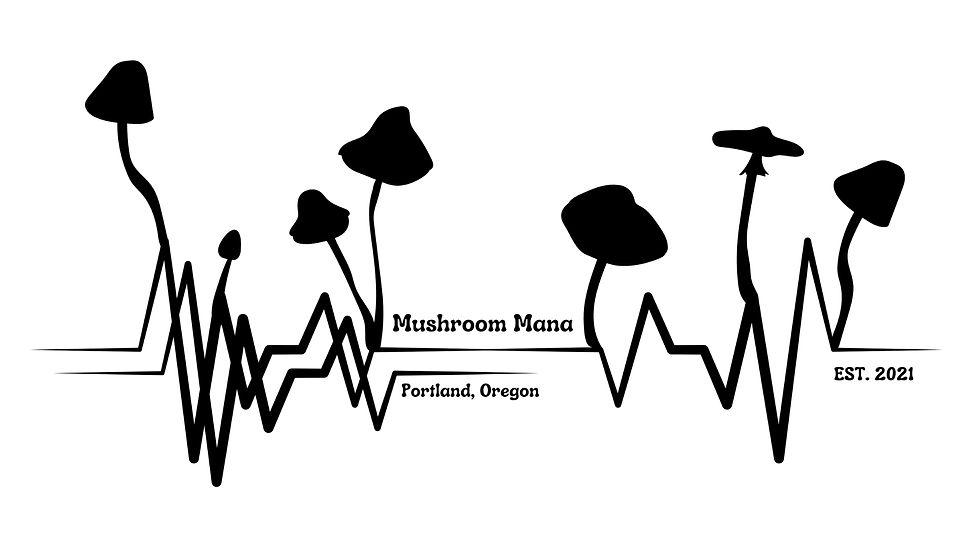The Power of Full-Spectrum Mushrooms: Fruiting Bodies + Mycelium
- Mikaela Zibolski

- Sep 30, 2025
- 3 min read

Using both fruiting bodies and mycelium maximizes the diversity of bioactive compounds, giving you the most holistic support mushrooms can offer
In this article you will learn
What are fruiting bodies and mycelium
The importance and differences between fruiting bodies and mycelium
Benefits backed by science
How our mushrooms are grown and processed
Full-Spectrum Mushrooms

When you think of mushrooms, you probably picture the classic caps and stems—the fruiting bodies. But there’s another part of the fungus that’s just as important: the mycelium, the intricate root-like network that spreads beneath the surface.
At Mushroom Mana, we use full-spectrum mushrooms, combining both the fruiting body and mycelium, to capture the complete spectrum of compounds these fungi have to offer.

Fruiting Bodies
The fruiting body is the most recognizable part of the mushroom because it is the part that appears above ground.

The fruiting body is the crown of the mushroom—what we see, taste, and harvest. It’s nature’s way of showing off the fungus in full bloom
Fruiting bodies concentrate unique compounds—like terpenes and phenolics—not found in the same ratios in mycelium (Berger, 2022).
Mycelium
Think of mycelium as the hidden roots of the mushroom world—quietly working underground, connecting, nourishing, and protecting

Mycelium forms the living network beneath the surface, producing stress-response metabolites and β-glucans that help modulate immunity (Ontawong et al., 2024).
Why Both Matter
By weaving together the strength of the mycelium and the brilliance of the fruiting body, full-spectrum mushrooms give you everything the fungus have to offer.
Fruiting bodies and mycelium each concentrate different bioactive compounds. Fruiting bodies tend to be rich in phenolics, terpenes, and certain polysaccharides, while mycelium can contain other unique metabolites, including β-glucans and ergothioneine, depending on the species and growth conditions (Berger, 2022). By including both, we aim to deliver a broader range of health-supporting compounds.
Combining fruiting bodies and mycelium creates a broader phytochemical fingerprint, delivering the full spectrum of mushroom compounds (Venturella et al., 2021).
Benefits Backed by Research
Immune Support
Mushroom polysaccharides, especially β-glucans, have been shown to modulate immune activity. Clinical studies report that preparations from both fruiting bodies and mycelium can enhance immune markers in healthy adults (Chen et al., 2023; Venturella et al., 2021; Ontawong et al., 2024).

Energy & Endurance
Cordyceps extracts—derived from both mycelium and fruiting bodies—have been shown in randomized trials to improve exercise tolerance, VO₂ max, and time-to-exhaustion in healthy adults (Hirsch et al., 2016).
Cognition & Mood
Lion’s mane (Hericium erinaceus) has been linked to cognitive support and mood benefits. Pilot trials suggest that extracts containing both fruiting bodies and mycelium may support memory, focus, and mental clarity, though more research is ongoing (Docherty et al., 2023).
Why “Full-Spectrum” Is the Gold Standard

Think of it like a symphony: each part plays a unique note, but together they create the full experience. Using both fruiting bodies and mycelium maximizes the diversity of bioactive compounds—together, they maximize the diversity of compounds your body can use.
How Mushrooms Grow and How We Process Them
All of our mushrooms are cultivated with care, starting from tiny spores growing on organic, gluten-free oats. This nutrient-rich base fuels the development of both the mycelium (the root-like network) and the fruiting body (the part you’d recognize as a mushroom). Together, these make up what’s called the full spectrum of the mushroom—capturing the unique compounds from every stage of growth.
“Our mushrooms and mycelium are harvested, gently dried, and milled together—preserving the full spectrum of beneficial compounds, just as nature intended.”
Once matured, the mushrooms—along with their mycelium biomass—are carefully harvested, gently dried, and milled into fine powders to preserve their natural potency. This full-spectrum process ensures you receive the complete profile of beneficial compounds, just as nature intended.
Once our mushrooms are in powdered form they all go through third party testing to ensure quality and safety.

References
Berger, R. G. (2022). Mycelium vs. fruiting bodies of edible fungi—a biochemical comparison. Foods. https://www.ncbi.nlm.nih.gov/pmc/articles/PMC9315710/
Venturella, G., et al. (2021). Medicinal mushrooms: bioactive compounds, use, and clinical evidence. Frontiers in Pharmacology. https://www.ncbi.nlm.nih.gov/pmc/articles/PMC7826851/
Hirsch, K. R., et al. (2016). Cordyceps militaris improves tolerance to high-intensity exercise in a randomized, double-blind, placebo-controlled study. Journal of Dietary Supplements. https://www.ncbi.nlm.nih.gov/pmc/articles/PMC5236007/
Chen, S. N., et al. (2023). Evaluation of immune modulation by β-1,3;1,6-D-glucan derived from Ganoderma (reishi) in healthy adults. Nutrients. https://www.ncbi.nlm.nih.gov/pmc/articles/PMC9914031/
Docherty, S., et al. (2023). The acute and chronic effects of Hericium erinaceus (lion’s mane) on cognition and mood: a pilot randomized controlled trial. Nutrients. https://www.ncbi.nlm.nih.gov/pmc/articles/PMC10675414/
Ontawong, A., et al. (2024). Immunomodulatory effects of a mycelium extract of Cordyceps (CBG-CS-2): a randomized double-blind clinical trial. Scientific Reports. https://www.nature.com/articles/s41598-024-58742-z

Comments